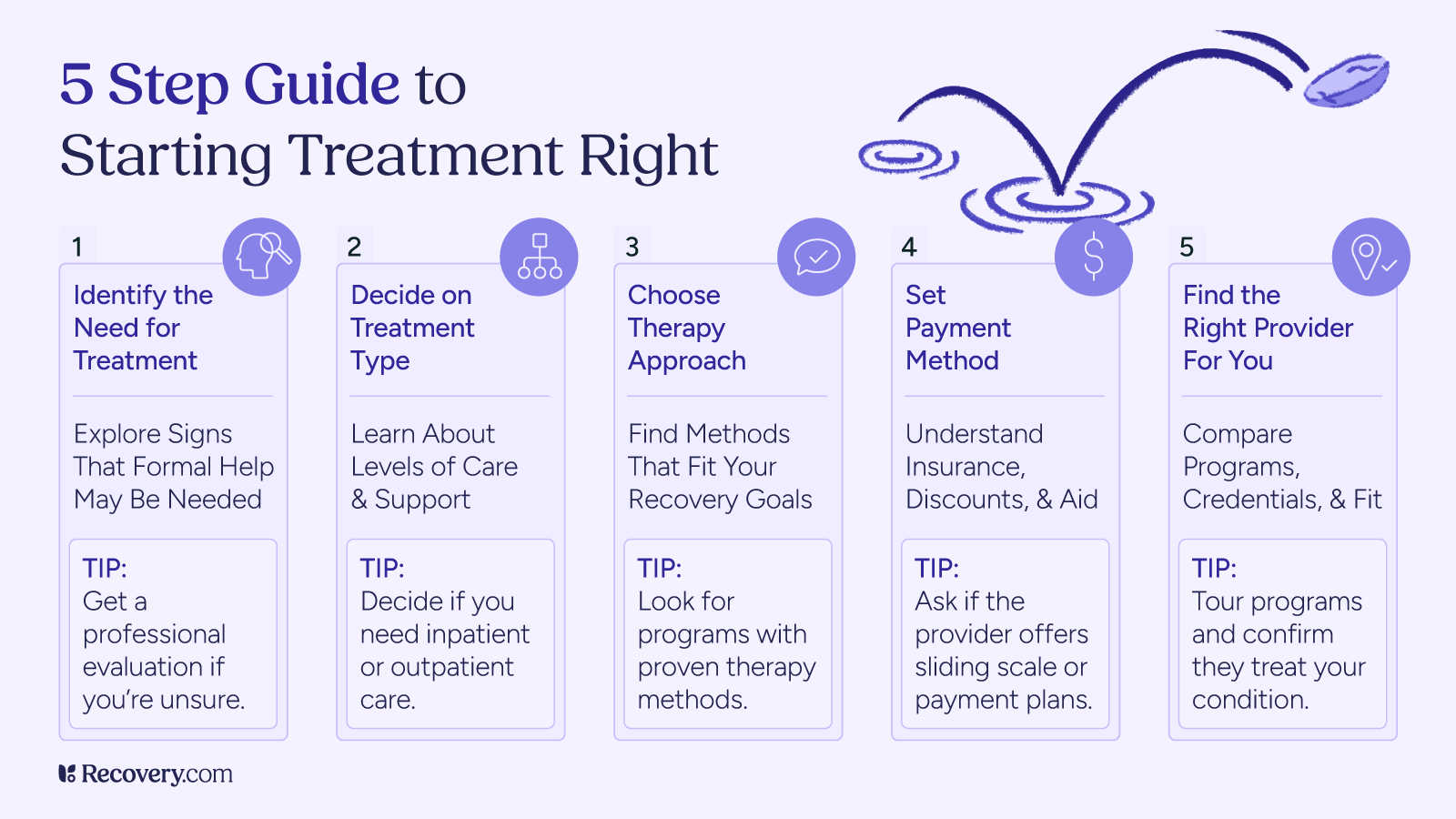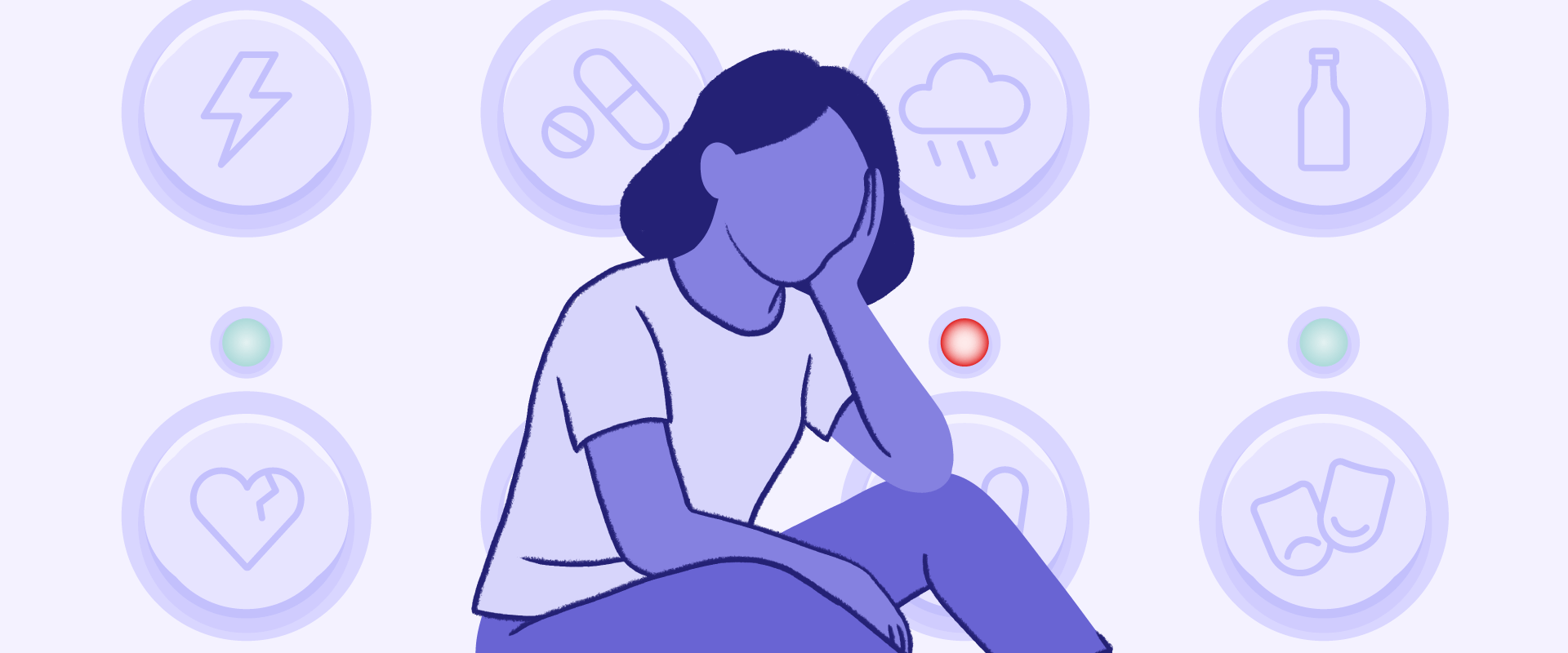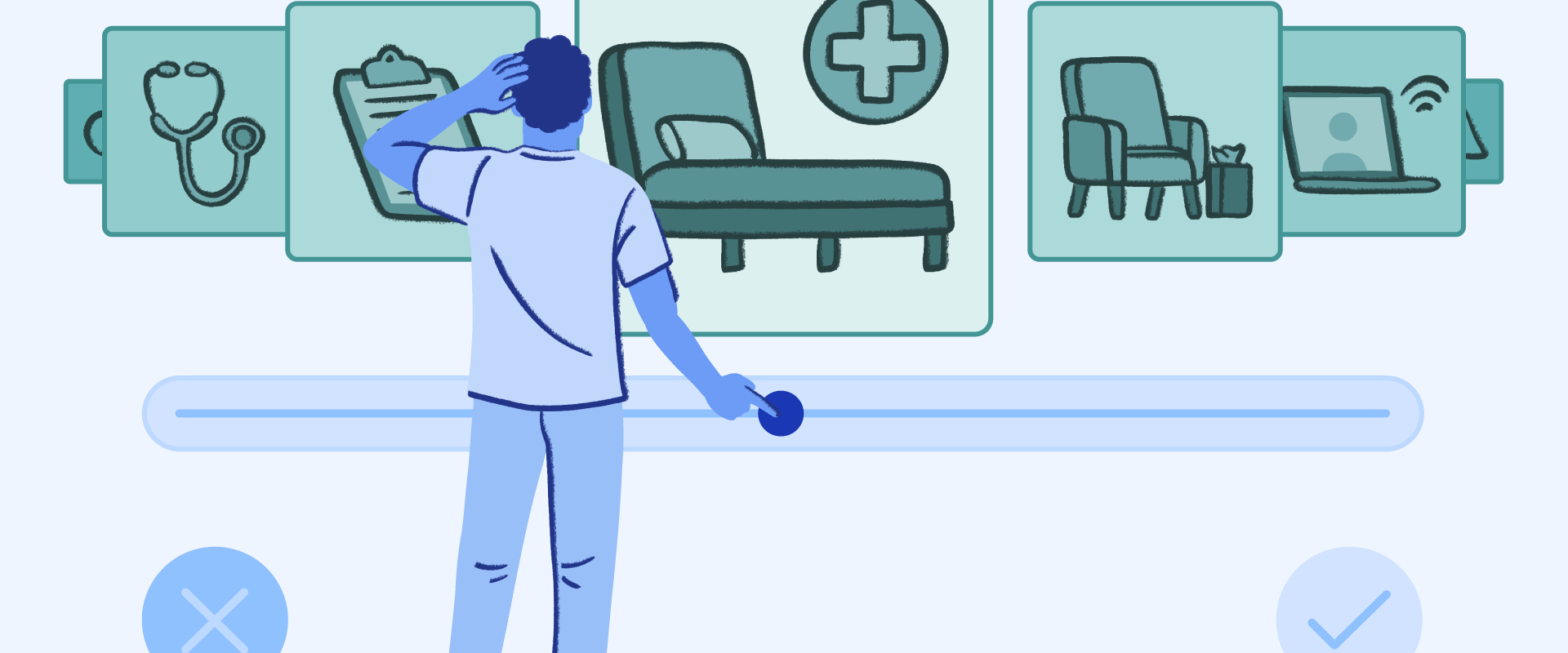The Ultimate Guide to Finding Mental Health and Addiction Treatment


Kayla holds over 6 years of experience in the rehab space, including in-house content management at a leading treatment center. She believes addiction and mental health issues are universal human experiences that can serve as important entry points onto a path toward self-realization and well-being.



Kayla holds over 6 years of experience in the rehab space, including in-house content management at a leading treatment center. She believes addiction and mental health issues are universal human experiences that can serve as important entry points onto a path toward self-realization and well-being.
Table of Contents
- 1. Do you need treatment? Recognizing the signs
- 2. Understanding your treatment options
- 3. Common types of therapy
- 4. What makes a quality treatment program
- 5. Red flags to avoid
- 6. Practical steps to find treatment
- 7. Understanding costs and payment options
- 8. Taking action: Start your recovery journey
- FAQs
Whether you’re dealing with addiction, mental health challenges, or both, we know how overwhelming it can feel to find the right care. But you don’t have to figure this out alone. We’ll walk you through your options so you can feel empowered to make the choices that feel right for you.
Note: Recovery.com is an independent organization that helps people find quality care. We don’t own any treatment centers or take payments to recommend them. Our mission is simple: To give you honest, straightforward information so you can make the best choices for your recovery.

Do You Need Treatment? Recognizing the Signs
You might be wondering if you actually need professional help. It’s common to feel uncertain—denial is often part of addiction,1 and concerns about cost or time can make treatment feel overwhelming.
The truth is, you don’t have to wait until you hit rock bottom to seek help. Treatment could be beneficial if you’re experiencing:
- Anxiety or depression that interferes with your daily life
- Using drugs or alcohol to cope with stress, emotions, or trauma
- Difficulty maintaining responsibilities at work, school, or home
- Physical discomfort or withdrawal symptoms when you try to cut back
- Friends or family expressing concern about your well-being
- A persistent feeling that something needs to change
If several of these resonate with you, it may be worth exploring your options. A conversation with a mental health or addiction professional can help you understand what level of support might be most appropriate for your situation.
Understanding Your Treatment Options
Recovery programs offer different levels of care to match your specific needs and circumstances. Understanding these options will help you make informed decisions about what type of support might work best for you.
Levels of Care
Medical Detox
If you’ve been using alcohol, opioids, or benzodiazepines regularly, medical detox provides safe, supervised withdrawal management. Medical staff monitor your comfort and safety during those first challenging days. Many treatment centers offer detox onsite or can connect you with trusted detox facilities nearby.
Inpatient (Residential) Treatment
This is what most people think of as “rehab”—you live at a treatment center while focusing completely on your recovery. It’s like pressing pause on daily life so you can concentrate on healing, with 24/7 support from qualified professionals. Programs typically run 30–90 days, with the option to stay longer if needed.
Partial Hospitalization Programs (PHP)
Day treatment offers intensive support while allowing you to sleep at home. You’ll spend your days in treatment (usually 30–40 hours weekly) but return home each evening. This works well if you have a stable home environment or you’re stepping down from residential care.
Intensive Outpatient Programs (IOP)
IOPs provide structured support while allowing you to maintain work or family commitments. You’ll attend treatment 3–5 days a week for several hours each day. This option works well when you need professional help but can’t step away from daily responsibilities.
Outpatient Therapy
Regular therapy sessions, typically weekly or biweekly, provide ongoing support for your recovery. This might be your primary treatment or part of continuing care after completing a more intensive program.

Sober Living
These structured living environments provide a substance-free home where you live with others in recovery. Sober living offers community support and accountability while you rebuild your life and develop new routines.
Common Types of Therapy
Quality treatment programs use evidence-based therapies that research has shown to be effective. Your treatment plan will be customized to your specific needs, and different programs offer various combinations of therapeutic approaches.
Some widely used, research-supported therapies include:
- Cognitive behavioral therapy (CBT) for changing thought patterns
- Dialectical behavior therapy (DBT) for emotion regulation
- Motivational interviewing for building motivation to change
- Trauma-informed therapy for addressing past experiences
- Family therapy for healing relationships
Many programs also incorporate complementary approaches like art therapy, yoga, or meditation to support your wellness alongside core therapeutic work.
Virtual Treatment Options
Online treatment has made care more accessible for many people. While virtual options aren’t suitable for detox or situations requiring round-the-clock support, they can work well for outpatient therapy, especially if transportation is challenging or you need scheduling flexibility.
Explore Drug Addiction Treatment Centers
What Makes a Quality Treatment Program
When you’re evaluating treatment programs, certain factors can help you identify providers that offer safe, effective care. Knowing what to look for will help you make informed decisions about your treatment.
Proper Credentials and Licensing
Quality programs display their credentials prominently and are happy to discuss them. Look for accreditation from nationally recognized organizations like The Joint Commission or CARF International, which thoroughly review treatment centers for quality and safety standards. Every reputable program should also have current state licensing from your Department of Health.
If you’re unsure about a program’s credentials, you can verify them through your state’s licensing board or the accrediting organization’s website.

Qualified Staff
The heart of any effective treatment program is its team. Quality programs employ licensed medical professionals, therapists, and counselors who specialize in addiction and mental health care. Medical staff should hold current state licenses, while therapists typically have credentials like LMFT, LCSW, or LPC along with experience in addiction treatment.
Many programs also include team members who have personal recovery experience, bringing both professional knowledge and lived understanding to your care.
Learn more about the different types of professionals who support your recovery in our guide to the people you’ll likely work with in mental health and addiction treatment.
Evidence-Based Treatment Approaches
Effective programs use therapies that scientific research has proven helpful for addiction and mental health conditions. These aren’t experimental techniques—they’re established methods with track records of helping people achieve lasting recovery.
Quality programs will be transparent about their treatment approaches and happy to explain how they customize care to meet individual needs.
Family Involvement
Strong programs understand that addiction affects entire families, not just individuals. They typically offer family therapy sessions, educational programs about addiction and recovery, and resources to help loved ones with their own healing process.
Learn more about how family therapy can strengthen relationships and support your recovery in our guide to going to family therapy in rehab.
Clear Communication
Trustworthy treatment centers prioritize open, honest communication. Staff should explain treatment approaches clearly, answer your questions thoroughly, and keep you informed about your progress. They should also be completely transparent about costs, what insurance covers, and any additional expenses you might face.
Red Flags to Avoid
There are plenty of quality treatment programs out there. But recovery is a vulnerable process, and it’s extremely important that you can trust your care team completely. Be cautious of programs that:
- Use high-pressure sales tactics or push you to enroll immediately
- Are vague about daily schedules, treatment methods, or staff qualifications
- Make unrealistic promises or guarantee specific outcomes
- Aren’t transparent about costs or add unexpected fees
- Offer kickbacks or incentives for enrollment (this is actually illegal)
- Can’t provide references or success stories from former patients
- Lack legitimate licensing or accreditation
- Have consistently negative reviews that mention safety or ethical concerns
Be cautious of hotlines and directory sites owned by treatment centers, as they may steer you toward their facilities rather than helping you find the best care for your needs. Learn how to identify trustworthy resources in our guide to finding ethical addiction helplines.
Remember, the right treatment center will respect your need to ask questions and take time to make an informed decision.
Practical Steps to Find Treatment
1. Get a Professional Assessment
Many treatment centers offer an initial, over-the-phone assessment to help you understand what level of care might work best. These conversations help match your needs to appropriate treatment options—you’re not committing to anything by having these discussions.
2. Understand Your Insurance Coverage
Most treatment centers have insurance specialists who will verify your benefits at no cost. They’ll work directly with your insurance company to determine what’s covered, including how many days of treatment are approved and what your out-of-pocket expenses will be.
You can also call your insurance provider directly to learn about your mental health and substance use benefits. Make sure to ask about in-network providers (which typically cost less) and get clear information about deductibles and co-pays.
Learn more about navigating insurance processes in our guide to using insurance to pay for residential rehab.
3. Research Your Options
Take time to explore different treatment centers that interest you. Use Recovery.com’s treatment finder to get detailed information about programs, including costs, photos, and what daily life looks like at each facility. Reading about other people’s experiences can also provide helpful insights—just keep in mind that everyone’s recovery journey is unique.
4. Know What to Ask Treatment Centers
When you contact treatment programs, don’t hesitate to ask questions. Inquire about what a typical day looks like, what types of therapy they offer, and how they address both addiction and mental health. It’s also important to understand how they involve family in treatment and what kind of continuing care they provide after you complete the program.
Make sure you’re asking the right questions to evaluate treatment programs with our comprehensive guide on what to ask a rehab center before making your decision.
Understanding Costs and Payment Options
Cost concerns shouldn’t prevent you from getting the help you need. Start by checking what your insurance plan covers—many centers are in-network with major insurance providers, which can significantly reduce your out-of-pocket expenses.
For those without insurance or with limited coverage, many facilities offer sliding scale fees based on income, payment plans to spread costs over time, or scholarships and financial aid programs. Some state-funded programs and nonprofit facilities also provide reduced-cost care.
Don’t let financial concerns stop you from exploring your options. Many treatment centers have financial counselors who can help you understand all available payment options and find a solution that works for your budget.
Get detailed information about treatment pricing, insurance coverage, and financial assistance options in our comprehensive guide to how much rehab costs.
Taking Action: Start Your Recovery Journey
1. Set a Start Date
Once you’ve chosen a treatment program, set a start date as soon as possible. While taking time off work or arranging family responsibilities can feel challenging, timing is often critical in recovery. Waiting weeks or months to enter treatment can increase health risks and prolong emotional struggles.
During your intake conversation, ask the treatment provider how soon they recommend starting. Whenever possible, follow their guidance—making recovery a priority now can prevent more complications later.
2. Prepare for Treatment
If you’re entering a residential program, check the provider’s website or speak with admissions for a detailed packing list. Most centers outline what to bring and what to leave at home, and many will send you information about rules, expectations, and what to expect during your first few days.
3. Stay Engaged
The first few days of treatment can feel overwhelming, but remember that staying engaged in the process significantly improves your chances of long-term success. The initial discomfort is temporary, but the healing and growth that follow can truly transform your life.
Ready to Find Treatment?
Recovery can profoundly change your life for the better. You deserve support in becoming your healthiest self, and quality care is available when you’re ready to take that next step.
Use our treatment search tool to explore options in your area and find programs that align with your needs, goals, and circumstances. The time to take action is now.
FAQs
Q: How do I know if I need residential treatment versus outpatient care?
A: The level of care you need depends on factors like the severity of your symptoms, your safety needs, and your home environment. A professional assessment can help determine what’s most appropriate for your situation.
Q: What should I look for to verify that a treatment program is legitimate?
A: Check for accreditation from The Joint Commission or CARF, current state licensing, qualified staff credentials, and transparent communication about costs and treatment methods.
Q: How can I afford treatment if my insurance doesn’t cover it?
A: Many centers offer payment plans, sliding scale fees, or scholarships. You can also explore state-funded programs or nonprofit facilities that provide reduced-cost care.
Q: Is it better to choose a local treatment center or travel for care?
A: Both options have benefits. Local treatment helps maintain family support, while a destination rehab might offer more privacy or access to specialized programs. Focus on finding quality care that meets your specific needs.
Q: What happens if I don’t feel ready to commit to treatment?
A: It’s normal to feel uncertain. You can start with outpatient therapy, attend support group meetings, or continue conversations with treatment professionals until you feel more prepared to take the next step.
-
Quigley, B. A. (2009). A comparative analysis of dropout rates and causes for students in STEM and non-STEM fields (Master’s thesis). Rochester Institute of Technology. https://repository.rit.edu/cgi/viewcontent.cgi?article=1321&context=article
Our Promise
How Is Recovery.com Different?
We believe everyone deserves access to accurate, unbiased information about mental health and recovery. That’s why we have a comprehensive set of treatment providers and don't charge for inclusion. Any center that meets our criteria can list for free. We do not and have never accepted fees for referring someone to a particular center. Providers who advertise with us must be verified by our Research Team and we clearly mark their status as advertisers.
Our goal is to help you choose the best path for your recovery. That begins with information you can trust.








